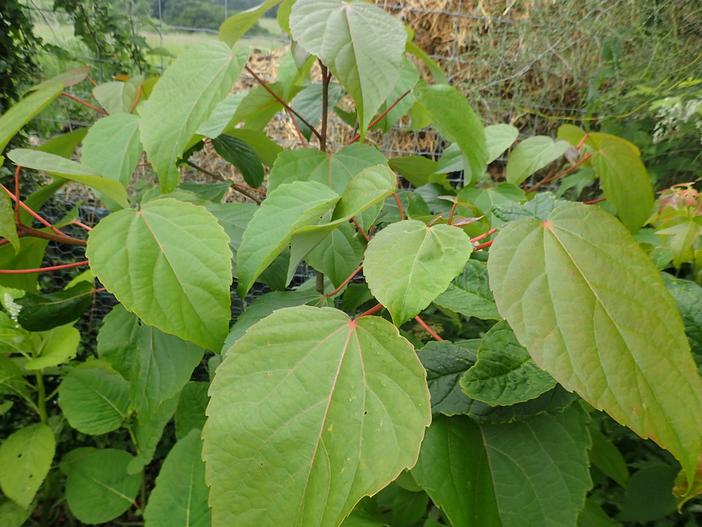Japanese Raisintree
(Hovenia dulcis)
Japanese Raisintree (Hovenia dulcis)
/
/

peganum
CC BY-SA 2.0
Image By:
peganum
Recorded By:
Copyright:
CC BY-SA 2.0
Copyright Notice:
Photo by: peganum | License Type: CC BY-SA 2.0 | License URL: https://creativecommons.org/licenses/by-sa/2.0/ | Uploader: peganum | Publisher: Flickr




































Estimated Native Range
Summary
Hovenia dulcis, commonly known as Japanese Raisintree, is a deciduous tree or large shrub native to temperate and subtropical regions in East Asia, including China, Japan, and Korea. It is not native to deserts. Typically, Hovenia dulcis grows to a height of 10–30 meters with a broad, spreading canopy. The leaves are glossy, large, and pointed, contributing to the tree’s ornamental value. In July, it produces clusters of small, cream-colored hermaphroditic flowers that are modest in appearance. The most notable feature of this species is its fruit; the drupes are borne at the ends of edible fleshy fruit stalks (rachis), which are sweet and resemble raisins when dried, hence the common name.
The Japanese Raisintree is valued for its unique fruit and the health benefits it purportedly provides when consumed as tea. It is introduced as an ornamental tree in various countries and is appreciated for its edible fruit. The tree is adaptable and prefers a sunny position on moist, well-drained sandy or loamy soils. It thrives in full sun but can tolerate some shade, requiring medium amounts of water and soils with medium to fast drainage. While it has ornamental appeal, Hovenia dulcis is potentially invasive in some regions, so caution is advised when planting it outside its native range.CC BY-SA 4.0
The Japanese Raisintree is valued for its unique fruit and the health benefits it purportedly provides when consumed as tea. It is introduced as an ornamental tree in various countries and is appreciated for its edible fruit. The tree is adaptable and prefers a sunny position on moist, well-drained sandy or loamy soils. It thrives in full sun but can tolerate some shade, requiring medium amounts of water and soils with medium to fast drainage. While it has ornamental appeal, Hovenia dulcis is potentially invasive in some regions, so caution is advised when planting it outside its native range.CC BY-SA 4.0
Plant Description
- Plant Type: Tree
- Height: 20-25 feet
- Width: 15-20 feet
- Growth Rate: Moderate
- Flower Color: N/A
- Flowering Season: Summer
- Leaf Retention: Deciduous
Growth Requirements
- Sun: Full Sun, Part Shade
- Water: Medium
- Drainage: Medium, Fast
Common Uses
Bee Garden, Bird Garden, Edible*Disclaimer: Easyscape's listed plant edibility is for informational use. Always verify the safety and proper identification of any plant before consumption., Fragrant, Low Maintenance
Natural Habitat
native to temperate and subtropical regions in East Asia, including China, Japan, and Korea
Other Names
Common Names: Mata Fome, Oriental Raisin Tree, Passa Japonesa, Uva-Do-Japão, Chinese Raisintree, Kemponashi, 헛개나무
Scientific Names: , Hovenia dulcis, Hovenia dulcis var. glabra, Hovenia dulcis var. koreana, Hovenia dulcis var. tomentella, Hovenia dulcis var. latifolia, Hovenia pubescens,
GBIF Accepted Name: Hovenia dulcis Thunb.